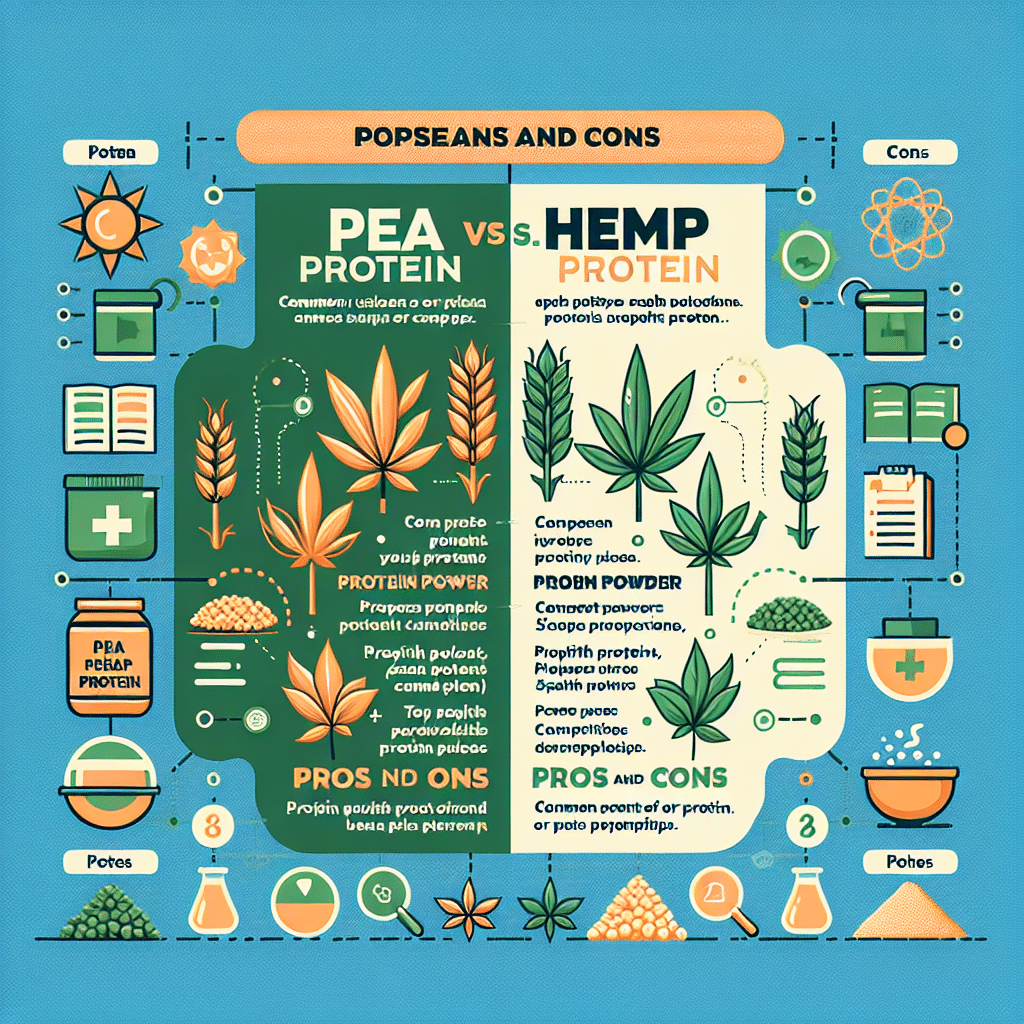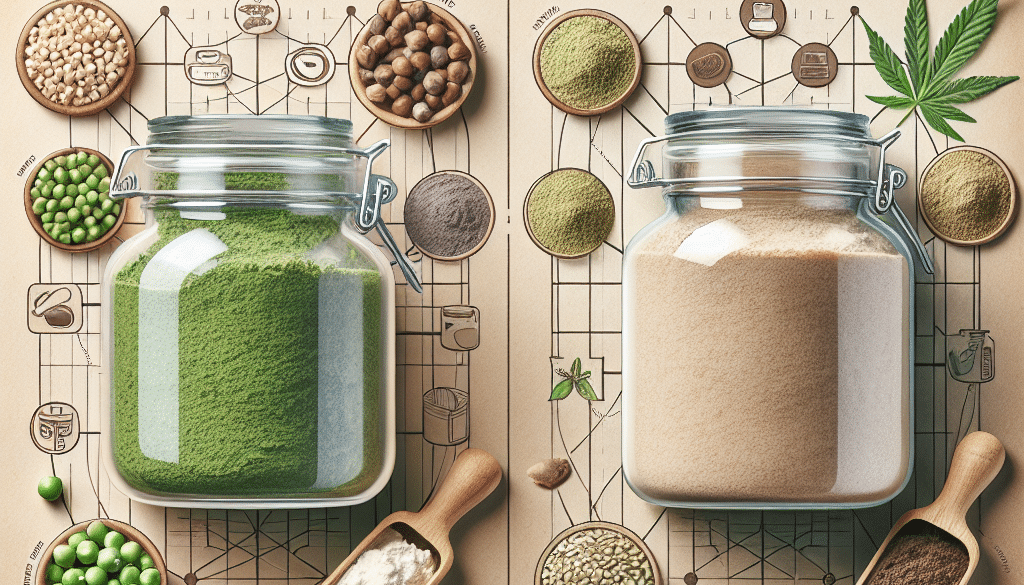Which Is Better Pea Protein Or Hemp Protein?
-
Table of Contents
- Pea Protein vs. Hemp Protein: Which Plant-Based Powerhouse Prevails?
- Nutritional Showdown: Pea Protein vs. Hemp Protein
- Digestibility and Allergenic Potential
- Environmental Impact and Sustainability
- Taste and Texture Considerations
- Use Cases and Versatility
- Conclusion: Weighing Your Options
- Discover ETprotein’s Premium Plant-Based Proteins
Pea Protein vs. Hemp Protein: Which Plant-Based Powerhouse Prevails?

As the demand for plant-based nutrition continues to grow, consumers are increasingly faced with a variety of protein sources to choose from. Among the most popular are pea protein and hemp protein, both of which offer unique benefits and have their own loyal followings. In this article, we’ll delve into the specifics of each protein type, comparing their nutritional profiles, digestibility, environmental impact, and other factors to help you determine which might be the better choice for your dietary needs.
Nutritional Showdown: Pea Protein vs. Hemp Protein
When it comes to choosing a protein powder, the nutritional content is often the deciding factor. Here’s how pea protein and hemp protein stack up against each other:
- Protein Content: Pea protein is typically higher in protein content, with most supplements providing around 20-25 grams of protein per serving. Hemp protein, on the other hand, usually offers around 12-15 grams per serving.
- Amino Acid Profile: Pea protein is rich in branched-chain amino acids (BCAAs) like leucine, isoleucine, and valine, which are crucial for muscle building and repair. Hemp protein contains all essential amino acids but is lower in lysine and leucine.
- Fiber: Hemp protein has the upper hand in fiber content, which can aid in digestion and promote a feeling of fullness. It typically contains around 8 grams of fiber per serving, compared to pea protein’s 1-2 grams.
- Fats: Hemp protein includes beneficial omega-3 and omega-6 fatty acids, which are important for heart health and inflammation reduction. Pea protein contains minimal fat.
- Minerals: Hemp protein is a good source of minerals like iron, magnesium, and zinc. Pea protein also contains these minerals but in slightly lower amounts.
Digestibility and Allergenic Potential
For those with sensitive stomachs or allergies, the digestibility and allergenic potential of a protein powder are critical considerations:
- Pea Protein: Pea protein is generally considered easy to digest and is hypoallergenic, making it a safe choice for most people with food sensitivities.
- Hemp Protein: Hemp protein is also easy to digest due to its high fiber content, and it’s unlikely to cause allergic reactions. However, some individuals may be sensitive to the specific fibers in hemp.
Environmental Impact and Sustainability
With an increasing awareness of the environmental impact of our food choices, sustainability is a significant factor for many consumers:
- Pea Protein: Peas have a relatively low environmental footprint. They require less water and fertilizer than many other crops and can even enrich the soil with nitrogen, reducing the need for chemical fertilizers.
- Hemp Protein: Hemp is an incredibly sustainable crop. It grows quickly, requires minimal water, and doesn’t need pesticides or herbicides. Additionally, every part of the hemp plant can be used, resulting in very little waste.
Taste and Texture Considerations
The taste and texture of protein powders can be a deal-breaker for some. Here’s what you can expect from pea and hemp proteins:
- Pea Protein: Pea protein has a mild, slightly sweet flavor and a smooth texture that blends well into shakes and baked goods.
- Hemp Protein: Hemp protein has a nuttier, earthier taste and a grittier texture, which some people may find less palatable or harder to incorporate into recipes.
Use Cases and Versatility
Depending on your lifestyle and dietary goals, the use cases for each protein type may influence your choice:
- Pea Protein: Due to its high protein content and BCAA profile, pea protein is often favored by athletes and bodybuilders looking to build muscle mass.
- Hemp Protein: Hemp protein’s balanced nutritional profile makes it a great all-around supplement for those seeking general health benefits, including improved heart health and digestion.
Conclusion: Weighing Your Options
In the debate between pea protein and hemp protein, there is no clear winner. The choice ultimately depends on your individual nutritional needs, dietary restrictions, taste preferences, and environmental concerns. Pea protein may be the better option for those focused on muscle building and recovery, while hemp protein could be the go-to for individuals seeking a more balanced nutrient intake and higher fiber content.
Both pea and hemp proteins are excellent plant-based alternatives to animal-derived proteins, and incorporating either into your diet can contribute to a healthy and sustainable lifestyle. As with any dietary supplement, it’s essential to consider the bigger picture of your overall diet and consult with a healthcare professional if you have specific health concerns.
Discover ETprotein’s Premium Plant-Based Proteins
If you’re looking to incorporate high-quality plant-based proteins into your diet, ETprotein offers a range of products that cater to various needs. Their pea and hemp proteins are organic, non-GMO, and allergen-free, ensuring that you receive the purest form of nutrition. With a neutral taste and high purity levels, ETprotein’s offerings are suitable for a wide array of applications, from sports nutrition to health and wellness products.
Whether you’re an athlete, a health enthusiast, or simply looking to add more plant-based options to your diet, ETprotein has a protein solution for you. Explore their extensive range and experience the benefits of their organic bulk vegan proteins and L-(+)-Ergothioneine.
About ETprotein:
ETprotein, a reputable protein and L-(+)-Ergothioneine (EGT) Chinese factory manufacturer and supplier, is renowned for producing, stocking, exporting, and delivering the highest quality organic bulk vegan proteins and L-(+)-Ergothioneine. They include Organic rice protein, clear rice protein, pea protein, clear pea protein, watermelon seed protein, pumpkin seed protein, sunflower seed protein, mung bean protein, peanut protein, and L-(+)-Ergothioneine EGT Pharmaceutical grade, L-(+)-Ergothioneine EGT food grade, L-(+)-Ergothioneine EGT cosmetic grade, L-(+)-Ergothioneine EGT reference grade and L-(+)-Ergothioneine EGT standard. Their offerings, characterized by a neutral taste, non-GMO, allergen-free attributes, with L-(+)-Ergothioneine purity over 98%, 99%, cater to a diverse range of industries. They serve nutraceutical, pharmaceutical, cosmeceutical, veterinary, as well as food and beverage finished product distributors, traders, and manufacturers across Europe, USA, Canada, Australia, Thailand, Japan, Korea, Brazil, and Chile, among others.
ETprotein specialization includes exporting and delivering tailor-made protein powder and finished nutritional supplements. Their extensive product range covers sectors like Food and Beverage, Sports Nutrition, Weight Management, Dietary Supplements, Health and Wellness Products, and Infant Formula, ensuring comprehensive solutions to meet all your protein needs.
As a trusted company by leading global food and beverage brands and Fortune 500 companies, ETprotein reinforces China’s reputation in the global arena. For more information or to sample their products, please contact them and email sales(at)ETprotein.com today.












